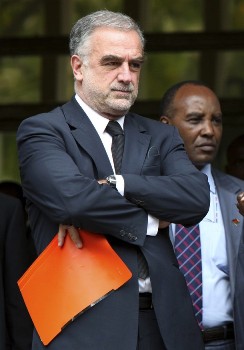ICC prosecutor confident Sudan’s Bashir to face justice
December 4, 2009 (WASHINGTON) – The prosecutor of the International Criminal Court (ICC) Luis Moreno-Ocampo expressed confidence today that the indicted Sudanese leader will ultimately stand before court to answer for crimes he allegedly orchestrated.
 “Respect for the court decision to issue an arrest warrant against president al-Bashir sends a clear message: president al-Bashir will face justice,” he told the UN Security Council in his semi-annual briefing on the Darfur case per resolution 1593.
“Respect for the court decision to issue an arrest warrant against president al-Bashir sends a clear message: president al-Bashir will face justice,” he told the UN Security Council in his semi-annual briefing on the Darfur case per resolution 1593.
“Any leader committing crimes will face justice” Ocampo added.
The ICC has so far indicted three other individuals besides Bashir including South Kordofan governor Hamed Haroun, militia leader Ali Kushayb and Darfur rebel leader Bahr Idriss Abu-Garda.
With the exception of Abu Garda who appeared voluntarily before the ICC judges to exonerate himself, all other suspects remain at large.
Ocampo also accused Bashir of continuing to provide shield for commission of crimes and covering them through hindering movement of Darfur peacekeepers and attempting to shift attention of the international community to the North-South conflict.
“President Al-Bashir, instead of stopping the crimes, is stopping the information about the crimes…..Al-Bashir will exacerbate such conflict if it can shift your attention from the crimes committed in Darfur,” he said.
“The decisions to expel humanitarian workers and silence others by threats of expulsion, or the attempts at restricting the freedom of movement of UNAMID are part and parcel of this policy to reduce the monitoring capacity of the international community.”
Ocampo emphasized in his briefing the findings of the African Union high level panel on Darfur headed by Thabo Mbeki saying it reached the same conclusions he reiterated about the failings of Sudanese courts in prosecuting the Darfur cases and the need for national proceedings to go after those not indicted by the ICC.
He said that the hybrid court proposal made by Mbeki panel requires changes to the laws on immunity, protection of witnesses and victims as well legislations on sexual violence all of which were outlined in the AUPD report.
The ICC prosecutor revealed that his office is analyzing whether or not other Sudanese officials could be tried if they are deemed to be denying and covering up the crimes allegedly committed by Khartoum in Darfur.
Asked whether Sudan’s UN Ambassador Abdel-Mahmood Mohammad, who vehemently rejects the allegations of crimes, could be targeted by his office, Ocampo said that he is only speaking about the standard used but that his case would be sent to the judges.
Later speaking to reporters, the ICC prosecutor gave the example of radio stations in Rwanda genocide which were fueling the killings and inciting violence, considered an action to have exacerbated the human toll.
The Prosecutor stressed that he needs the UNSC full support to ensure that the attention remains on the need to arrest the indicted suspects and to end crimes in Darfur.
Most countries on the UNSC including US, UK, France, Croatia, Austria, Japan and Mexico called on Sudan to cooperate with the ICC and adhere to resolution 1593.
However, Russia, China, Turkey and Burkina Faso urged a balance of peace and justice pursuit so as not to derail post-conflict healing process.
The Libyan delegation lashed out at the ICC and UNSC accusing the latter of hypocrisy on actions taken with regard to Goldstone report on Israeli attack on Gaza strip and reluctance by council members for forcing the Jewish state to investigate the alleged war crimes.
The Sudanese envoy dismissed the ICC activities saying it is a “closed case” for his government and described Ocampo as a “mercenary of death and destruction” and accusing him of “lies” and trying to politicize his office.
Asked about what Ocampo mentioned on Sudanese government intention to close IDP camps in Darfur, Mohammed said that this was a lie adding that there is mass voluntary return by the displaced and high turnout to register for vote in April 2010 elections.
Last month the Sudanese humanitarian aid commissioner Hasabu Abdel-Rahman said that the Sudanese government has plans to close down displaced camps in the greater Darfur region by early 2010.
He added that the IDP’s will be given two choices either move to their villages or to the new housing complexes but did not specify the consequences for rejecting the options.
The UN says up to 300,000 people have died and 2.7 million fled their homes since ethnic minority rebels in the western region of Darfur first rose up against the Arab-dominated government in Khartoum in February 2003.
The Sudanese government disputes the death toll saying 10,000 people died.
(ST)
